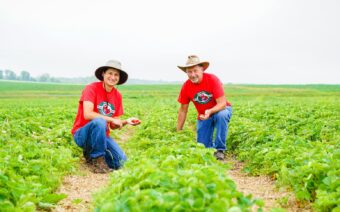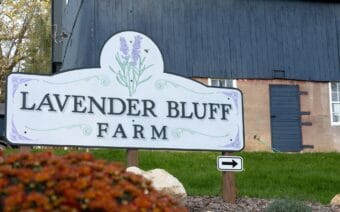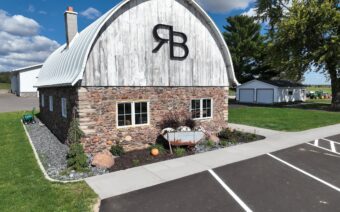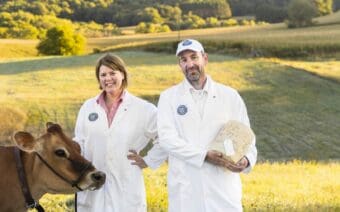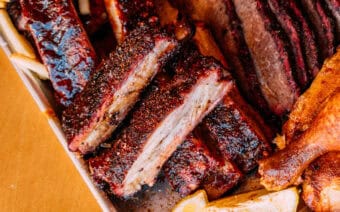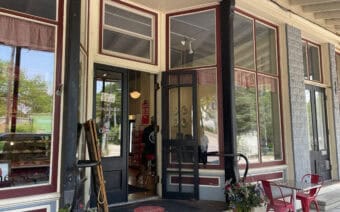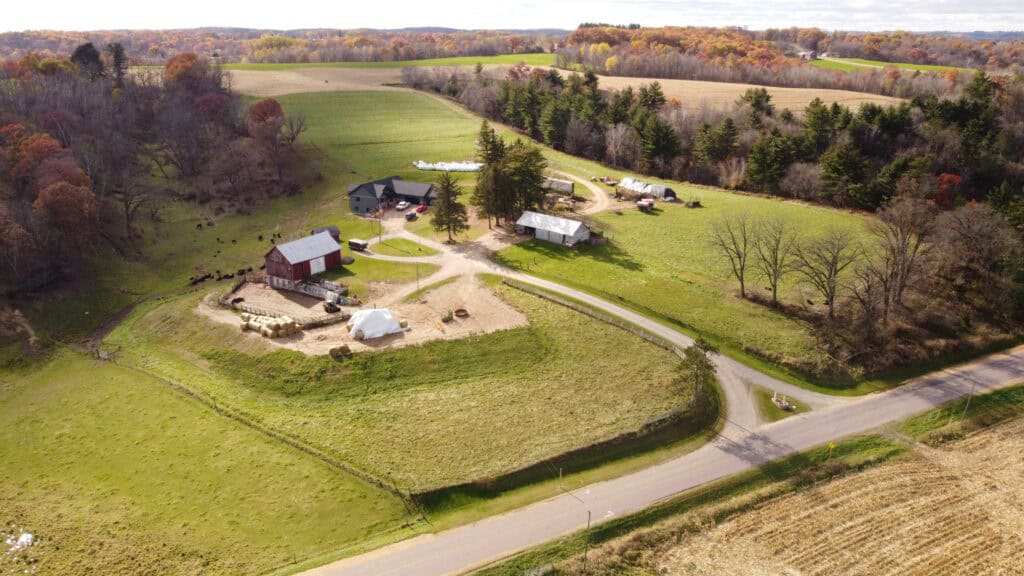
May 27, 2024
ELROY – Silver Star Farm is an all-in-the-family labor of love, with three siblings sustaining the land and legacy their parents first established in 1982.
It all started when the trio’s parents, Rodney and Sharon Knuth, purchased a dairy farm in the rolling hills of West Central Wisconsin – more specifically in Elroy, a town of about 1,500.
The farm’s name – Silver Star Farm – Amy VanderMark, daughter and current co-owner, said was inspired by the lyrics in her parents’ wedding song: “I’m Just A Country Boy” by Don Williams.
“The song seems like it was written specifically for our parents because they were farmers,” Amy said. “The song goes, ‘I have silver in the stars and gold in the morning sun…’ We love how the name came to be. We make sure the next generation knows that two people had a dream of farming together, and farming as a family is important.”
All in the family
Though the farm originally operated as a dairy farm, it now focuses on beef cattle and crops.
When Rodney and Sharon sold their dairy cows in 2000, daughter Kelly Green purchased her first beef heifer to show at local fairs, and the beef herd at Silver Star Farm took shape.
By 2007, Amy said she and her brother, David Knuth, sought to preserve the legacy of the farm and purchased 50% of it.
In 2015, when their father passed away, Amy said they faced an important decision: scale back the farm, continue with it as it was or grow it.
With all three having full-time careers off the farm as well, Amy said, “we decided we wouldn’t make any major decisions for one or two years to make sure we didn’t make any rash changes.”
The Knuth siblings said those ensuing years taught them what was realistic in terms of balancing farm operations, full-time careers and families of their own.
In 2018, Amy said she moved back to the farm to grow the cattle herd.

She said Kelly worked onsite frequently, and David spent many weekends and summer days during his summer break from teaching working on the farm, often with his son, Ben, in tow.
The siblings said they continue to work full-time jobs off the farm – Amy works in sales, Kelly in human resources and David as a teacher – but together, they manage the everyday needs of the farm.
Each sibling manages different areas of the farm – with Amy managing the cattle, the finances and beef sales; David managing crops, operations and facilities; and Kelly supporting the farm wherever needed, including working with the animals.
Amy said David’s son Ben also chips in – working with the cattle, installing and fixing fencing and providing input on breeding.
Ben, she said, is also a trained butcher and hopes to put that knowledge to work on the farm someday soon.
“We gather on evenings, weekends and breaks to tackle specific farm chores, including planting and harvest season, bedding and manure handling and fencing,” Amy said.
Farming for the future
These days, Amy said the farm operates as a family-owned beef and crop farm that sells five-star, sustainably-raised Black Angus beef directly to customers.
Silver Star Farm, she said, has a herd of about 45 Angus beef mamas and aims to have beef available every month for customers throughout the area and beyond.
“The cows are raised on a hay- and corn-based diet containing no hormones or antibiotics,” she said. “They have the freedom to decide what they eat and how much they eat at any particular time.”
Amy said the manure is used to naturally fertilize the soil, resulting in improved soil health and sustainable growing practices – for the farm’s nearly 300 acres of corn, soybeans and grass/alfalfa.
She said they sell all of its soybeans and 90% of its corn to a local cooperative while retaining the grass/alfalfa to feed the herd.
The future, Amy said, is top of mind for her and her siblings.
As the farm continues to grow, she said they know they need to continue to adapt and preserve the land and their farm for the next generation.
The result is a carefully curated, three-year plan focused on investment in the land, the animals and education/research.
And though many aspects of farm operations are being evaluated, Amy said one thing remains consistent – the farm’s goal is to deliver consistent, high-quality Black Angus beef.
“It’s one thing to get the (tenderness) the first time, but customers witness the same quality in the beef year after year,” she said.
More so nowadays, Amy said people seek meat they know is coming from one animal locally raised and won’t contain added preservatives.
Meat purchased directly from a farmer, she said, can look different from what people are used to in their grocery store-bought beef.
“This is particularly evident with ground beef, as ours is a little browner or more purple because it’s going directly from the cow to packaging,” she said. “The more oxygen beef has, the more redness.”
Many customers, Amy said, also purchase beef in bulk to satisfy their family’s needs for the better part of a year at a time – with 99% of Silver Star Farm purchases being bulk.

“It’s a huge investment upfront, but it saves thousands of dollars a year versus buying beef at the grocery store,” she said. “Over the long-term, it’s much cheaper, so many people don’t realize (that) until they talk to us that they need a (substantial) freezer for all the meat.”
Though plans are in place to increase Silver Star’s herd, Amy said it will happen gradually over time to take being good stewards of the land and other planning into consideration.
“We will ensure we continue to provide the best source of Angus beef to customers’ tables, and that starts with land management,” she said.
Future focus
Amy said sustainable practices are nothing new to the farm.
Among many other things, the Knuth siblings already:
- Participate in the Wisconsin’s Conservation Stewardship Program
- Plant cover crops, such as winter rye to reduce erosion, improve soil health and suppress weeds, not to mention enhance water retention and nutrient cycling
- Rotate crops
- Do nutrient management planning to optimize fertilizer use and protect water quality
- Implement no-till or reduced tillage practices to minimize soil disturbance and erosion
In addition, with a focus on the future, Amy said the family has created a three-year plan to build upon that in the name of stewardship – which includes changing some of its row crops into grazing pastures and working with specialists to develop a grazing plan.
This will require finding solutions on how to deliver water to the grazing pastures, creating a water plan and figuring out how to move the cattle – which Amy said is no small feat.
“This is intentionally a three-year plan so we can dip our toes into it,” she said. “It’s a process – moving from row crops and grasses that are annuals to grasses that are perennials.”
But, Amy said, it will be worth it, as rotational grazing will improve forage quality, soil health and pasture productivity.
The Knuth siblings said they anticipate moving into the implementation stage for rotational grazing this fall and/or next spring.
In many aspects of the plan, the siblings said they are in what they describe as a research-and-development stage on this and other efforts.
“We’ll take regenerative (efforts) and sustainability even further by putting carbon back into the soil naturally,” David said. “Cows’ hooves naturally work the ground, so over the next three years, we plan to take our home farm that has been traditionally row-cropped and move it into an intensive rotation with our cows.”
Other facets of the farm’s three-year plan, David said, are focused on:
- Technological advancements
- Market expansion
- Diversification of enterprises or crops
- Infrastructure development
- Technological advancements to optimize resource use
- Increase yields and streamline operations
- Market expansion
- Community engagement
- Financial growth and stability
- Generational transition
“Transitioning to the next generation means integrating new ideas, skills and perspectives into the management and decision-making processes they bring to the farm,” he said.
Spreading the word
Simultaneously, Amy said they will see the herd growing with the next generation to support growing beef sales to consumers.
Building up sales, she said, means creating more brand awareness – with word of mouth continuing to be a strong source of inquiries and sales.
In the past, Amy said inquiries often came via phone or email messages requiring follow-up emails – which included sharing a variety of information with them on the beef, the farm, their story and more – a lot of legwork that didn’t necessarily always result in sales.

“We were retelling our story and educating new customers all the time,” she said.
About five years ago, the farm established a Facebook page that allowed it to share its family’s story, and then about a year ago, invested in a professional website (silverstarfarmwi.com), which the siblings said was a worthwhile investment.
“It’s been huge for us to send people to (the site) for education and learn how to begin the process of building a relationship with us,” Amy said. “They learn what our cows eat, who our family is, how much beef they will get, what size freezer they need to have and what cuts of beef they may like based on what they buy at the grocery store. And in the process, we begin to build trust.”
David said he appreciates the opportunity to build trust by telling the family’s story so vividly on the website.
“People want to develop a relationship, build trust and get information – and those are three things they find on our website,” he said. “They want to know the story and be a part of it.”
To continue that outreach, the trio said they are planning a special farm-to-table event in early October at the farm.
Amy said it will give people first-hand exposure to farm operations, including the herd they ask so much about.
Nurturing a legacy
Though it’s no easy feat to balance full-time jobs with the demands of running a farm, the siblings said they consider it more than worthwhile.
Weekends, Amy said, are often designated for bigger chores that require more sets of hands – “we call it our quality time.”
“On a weekend, we may have three to eight of us there, between spouses and kids, plus the kids’ friends and others, as we have an open door policy,” Kelly said. “The farm brings us together, and we usually pray together and have a meal together. Other people go on vacations together, but our time together is on the farm.”
Amy said the farm is more than just a piece of property.
“It’s a cherished part of our identity, a source of inspiration and a legacy we are committed to nurturing for future generations,” she said.
 Growing family traditions, one pine tree at a time
Growing family traditions, one pine tree at a time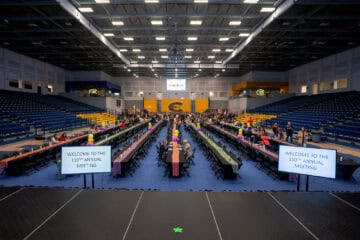 ‘It’s about being a champion, a convener and a catalyst’
‘It’s about being a champion, a convener and a catalyst’

